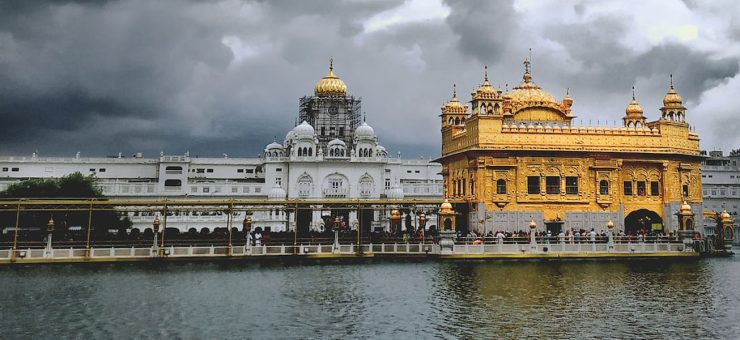Punjab is an extremely industrious and understands the dignity of labour, making this one of the most prosperous States in India. The resultant affluence is delightfully evident in the Punjab villages – neat roads, brick and mortar (‘pucca’) houses with TV aerials stuck atop their roofs and Maruti cars parked next to the tractors. The women love to dress up in clothes lined with shimmering gold and silver threads (gota).
The colossal 226m high Bhakra Dam, the highest dam in the India, has been described as a ‘temple of modern India’. It provides water and electricity to the State, and has helped the farmer rise to his full potential and usher in the green revolution. Initially only a wheat growing region, Punjab is now a major rice producer as well.
The Sikh faith came into being in the Punjab. To the Hindus and Sikhs, Amritsar is synonymous with the holiest shrine of Sikhism, the Harmandir Sahib or Golden Temple. It calls to the devotee in all corners of the world. A double storey marble structure, its dome is covered with gold, as indeed are those of many Sikh temples (gurudwaras) all over the country. This is due to the devotion of the people for whom offering a part of their earnings is very important. Manual labour or ‘kar seva’ is another very important offering. It may be in the form of sweeping and washing the gurudwara premises, cooking or actually bricklaying and building the place.
Punjab Pilgrimages, Sikh Temples, GurudwaraLudhiana is famous for its woollens. Big and small business houses abound, all making the softest of woollens for the fashionable. And ‘Made in Ludhiana’ is a mark of excellence. Bicycles, on which millions of Indians depend, are also made here by the world’s largest manufacturer of bicycles, Hero Cycles.
The State produces 10% of the milk in the country, though having only 1.5% of the land. The robust Punjabi loves his milk, butter and giant sized glass of ‘lussi’ (yoghurt churned with water and flavoured with salt, cumin seed powder and coriander leaves). He also loves to eat his ‘maa-dee-daal’, ‘sarson-da-saag’ and ‘makki-dee-roti’. There is no point in describing these. One has to have them served piping hot at any of the multitude of roadside open air cafes called ‘dhaabas’.
